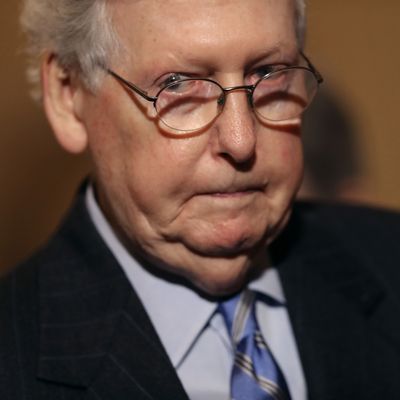
Last night, Mitch McConnell unveiled the Republicans’ economic rescue plan. The good news is that Senate Republicans have abandoned their Obama–era position that fiscal stimulus can’t work and the government should respond to tough times by cutting spending. The bad news is that they haven’t abandoned their long-standing belief in screwing over poor people just for the sake of it.
The plan has some attractive features — most notably, a clever plan to loan money to small businesses that keep their payrolls intact through June. Its downsides include an absence of desperately needed relief for state budgets and anti-poverty spending, all of which will face unimaginable levels of stress, and excessively generous corporate bailouts.
But the most perverse aspect lies in the design of its central feature: payments to every American. The checks, for up to $1,200 a person, are designed to inject spending into the economy and help families pay for necessities during the crisis. The concept makes perfect sense. But Senate Republicans made two curious decisions. They decided not to send the checks to affluent households, phasing them out for salaries starting at $75,000.
There is a trade-off here, and a bad one. On the plus side, it saves the government a tiny bit of money, and adds a tiny bit of fairness, by denying subsidies to the slice of the public that least needs it. On the negative side, it adds complication and decreases speed by tying the payments to income, rather than simply sending a check to everybody. Worse, the basis for the phaseout is 2018 income, so if you’re, say, a small-business owner who made $100,000 two years ago, but have since had to close your doors and are making nothing, you’re too rich to qualify for relief.
Even worse, Republicans not only phased out the payments at the top, they phased them in at the bottom. The poorest families, who have no taxable income, would only get $600. The maximum $1,200 benefit wouldn’t kick in until an individual hits $23,500 or a married couple’s income reaches about $47,000. Roughly 64 million of the poorest households would fail to get the full benefit, according to Kyle Pomerleau of the American Enterprise Institute.
What possible reason could have motivated this limitation? Saving government money by denying it to the people who need it the most? Punishing poor people for their decision to be poor? Those with the lowest incomes are the most likely to spend every dollar and the least likely to save it, making payments to the poor the most efficient form of stimulus, in addition to the most socially humane expenditure. On top of that, income verification requires time-consuming work by the IRS. Doing that to deny rich people money is silly. Doing it to deny poor people money is maniacal.
Fortunately, Republicans need half a dozen Democratic votes to pass anything through the Senate. There is absolutely no reason for Democrats to let this outrage pass the upper chamber.






























